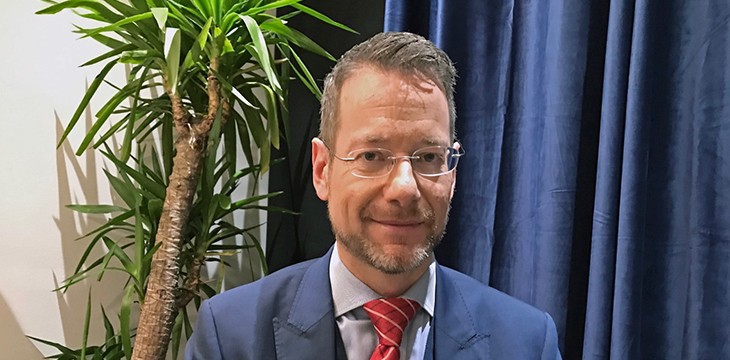|
Getting your Trinity Audio player ready...
|
Daniel Diemers started out as a coder in the Eighties. Interested in the interactions between international gamers in the earliest stages of online multiplayer gaming, he studied trust-building among virtual communities as his PhD subject. Digital native Daniel was able to grab the attention of big corporations, even back then during the first dot-com era.
Fast forward to today, and as a business strategy consultant, Daniel makes the world of blockchain accessible to the world’s biggest corporate players. “Digitalization for corporations is quite a complex thing,” he says. “It’s not just blockchain; they’re looking at other technologies depending on the industry – drones or robots or augmented reality, virtual reality. So, in the boardrooms today the heat is rising because the exponential technologies are coming with full force.”
The “fascinating thing about the blockchain ecosystem” is the high levels of engagement and communication online. “They interact almost like tribes” says Daniel, “and of course, now it touches the borders of the large corporates. And they’re looking at this and they see it. It’s a different language. It’s different values.”
In this week’s CoinGeek Conversations podcast, Charles Miller asked how Daniel’s discussions of blockchain play out in the boardroom. They involve dispelling the hype, myths and negative perceptions, Daniel replied, whilst also showing the opportunities. “Ignore all the Silk Road stories. Topics like criminals and fraud; this has been riddling our industry now for the past years. It’s no secret. I mean, that was in the past. We’re going into the future …As a strategy consultant, when I work with clients, I always look at the opportunities. I look at growth …I try to take a fair and square look at it, saying these are the opportunities. You can either wait or you can dive in now and give them the options.”
For Daniel, the most important sell is also the hardest one: a global logistics solution that exists on chain. “I see a risk in that most pilots are not that spectacular. Because if you don’t pursue the big vision but you go after a very small little tiny use case, then they jump on a permission blockchain for that and they don’t see the benefit of doing this on a large scalable one …And of course, results can’t be that spectacular because it’s just a little thing. You’re not swimming out in the ocean. You’re just dipping in the hotel pool. And that’s just not the real thing.”
Looking to a future world, in 10 to 15 years, that may be shaped by self-driving, Daniel lays out a compelling example of why the system would require a public blockchain, relying on large scalable micro-transactions, rather than a private, permission-based one.
“Imagine in just the city of London, if all cars were moving in sync using AIs. How do you do all these micro-transactions? How do they communicate with each other? If there’s going to be a master database sitting here somewhere in the city, I mean, that’s a recipe for disaster. The database goes down. Hackers can penetrate it. So then probably it will be a large, scalable, microtransaction-enabled blockchain required. And this is probably where, of course, BSV comes in. But to get there, that is a big step because you need to convince the car makers, the road toll, the government, the city of London, responsible for the traffic lights. The ecosystem needs to be complete and to build that; that’s a very bold vision.”
So how do we get there and what do corporates need to see when it comes to choosing a blockchain? Daniel points to solid regulations and legalities “and then they want to see how big the ecosystem is. I think this is also very important, and that’s something where BSV has to grow …They want to know there’s a steward of the protocol or there’s mechanism built or there’s companies like nChain where I can go in and find qualified people that can help me with something …This is why Hyperledger [IBM’s private blockchain] and protocols like that are very appealing to large corporates.”
Stressing that the time is now, before corporates build on other platforms, Daniel’s advice to the BSV community is to actively seek out big business. Building applications is already a reality on BSV and so it’s time to show that the solutions lie here.
Human interaction is still an intrinsic part of how we interact digitally, says Dr. Daniel Diemers “virtual communities, beyond the knowledge exchange, provided support.” In these times of COVID 19 and quarantine, the volume and style of digital interactions are unprecedented. What can we all learn from the early days of dot com communication? Human relationships, and trust, must be embedded at the building block.
OR
Listen to Dr Diemers in full on this week’s CoinGeek Conversations podcast:
Check out more great interviews from CoinGeek Conversations:
– Watch on the CoinGeek Conversations YouTube playlist
– Subscribe on iTunes
– Listen on Spotify
– Visit the CoinGeek Conversations website
– Search for “CoinGeek Conversations” wherever you get your podcasts

 03-01-2026
03-01-2026 




